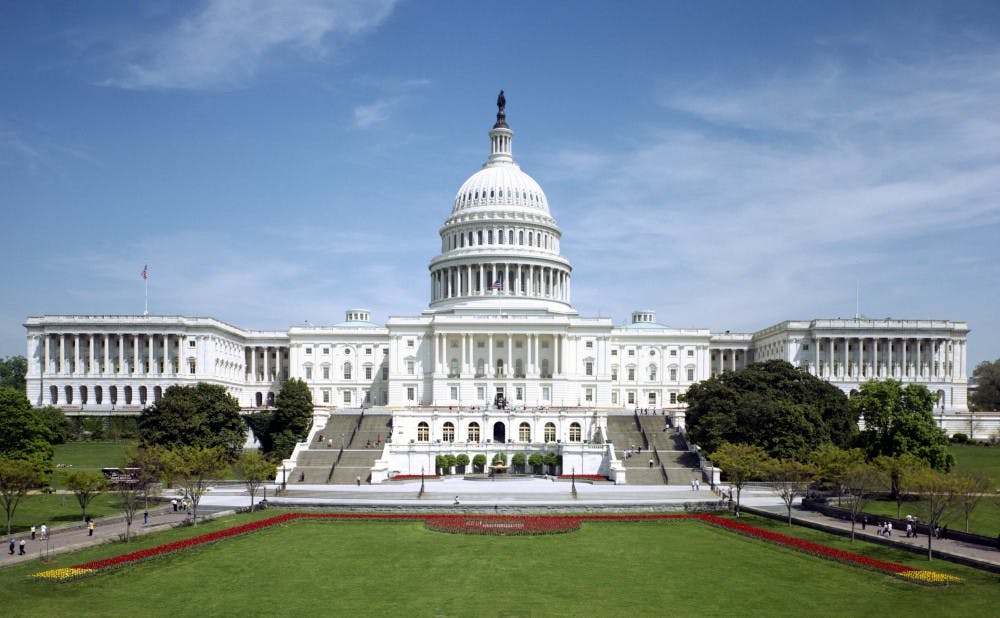On what was supposed to be a regular Wednesday, sophomore Dan King was watching the certification of Arizona’s electoral vote in the Senate when he noticed the senators being evacuated from the chamber.
Hoping to see the end of a tumultuous election cycle, King did not expect to watch rioters in support of then-President Donald Trump push through the police forces to enter the Senate chamber.
“I was very nervous to watch how the event unfolded. It was only the matter of time when these protesters would get to the Senators,” King said.
At the same time, Duke Kunshan University first-year Ooha Reddy was going about with her normal schedule when she noticed her Twitter and Instagram feeds exploding with news. It was surreal, a dystopian picture of a failing American democracy, she said. She could not believe what she was watching.
On Jan. 6, Americans watched as rioters stormed the Capitol building. The insurgents broke into legislative offices and the Senate floor to disrupt the certification of the 2020 election results, which ultimately confirmed President Joe Biden’s victory. Having watched these events unfold from all over the world, Duke students expressed their thoughts on the riots.
King, who described himself as moderately liberal, looked back on the event with disappointment. Watching Trump’s speech earlier in the day, he had expected there would be violence, but he did not foresee an insurrection.
Sophomore Jonah Perrin, a member of the Duke Democrats executive team, shared this sentiment.
“I was somewhat surprised. I think the president’s rhetoric has inspired this coup. At the same time, I did not expect people actually trying to storm the Capitol after the election. The idea has never crossed my mind, but I guess it made sense in retrospect,” Perrin said.
Sophomore Philippe Izedian, a libertarian Republican, said the riot left him disheartened. To him, it represented the way in which Republicans—especially those who previously condemned rioting and protesting—have abandoned their ideals and their commitment to democracy.
Watching the result of the presidential election, Izedian said that he expected a peaceful transition of power. Izedian said that Trump frequently commends the Founding Fathers and American democracy, but he felt that Trump did not honor his words when he accused Democrats of committing voter fraud and mail-in ballots of delegitimizing the election.
“As naïve as it sounds, I expect the president to protect how the country votes—even if it’s against him—especially in the pandemic,” Izedian said. “I do not think mail-in ballots are the issue. The vote reflected the will of the people.”
Duke Kunshan University first-year Erica Ham condemned Trump for inciting a riot that claimed the lives of five people. Like other students, she was surprised and heartbroken by the attack. She also mentioned the hypocrisy of Trump supporters who denounced last summer’s Black Lives Matter protests.
King, Perrin and Reddy agreed, saying that protesters against police brutality were treated very differently from the people that stormed the Capitol.
During the attack, Trump’s hesitance to condemn the protesters contrasted Biden, who sternly criticized the attack and called for national unity.
“I hope we can unify after this,” Perrin said. “However, it requires officials holding these rioters accountable, and they do not compromise on their principles. White supremacists do not recognize the legitimacy of this election. If unifying meant compromising in the direction of working with white supremacists, then don’t. If everyone can work together on crucial issues, that would be awesome.”
Izedian and Reddy both said they hoped that people from different parties could come together, listen to one another and lower the temperature. They criticized how contemporary politics is reduced to partisan attacks without compassion.
Students generally agreed that Trump’s legacy will be stained by this event. Izedian called Trump’s legacy “one of polarization,” while King deemed Trump “the worst president in history.”
Get The Chronicle straight to your inbox
Sign up for our weekly newsletter. Cancel at any time.
Tri Truong is a Trinity junior and an associate news editor of The Chronicle's 117th volume.

